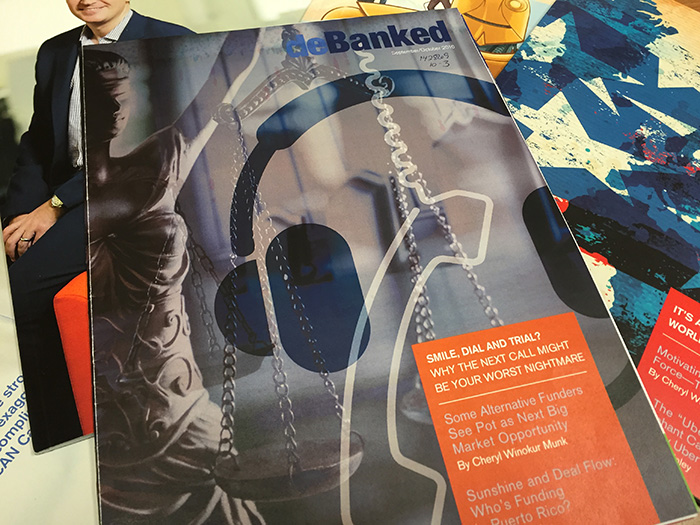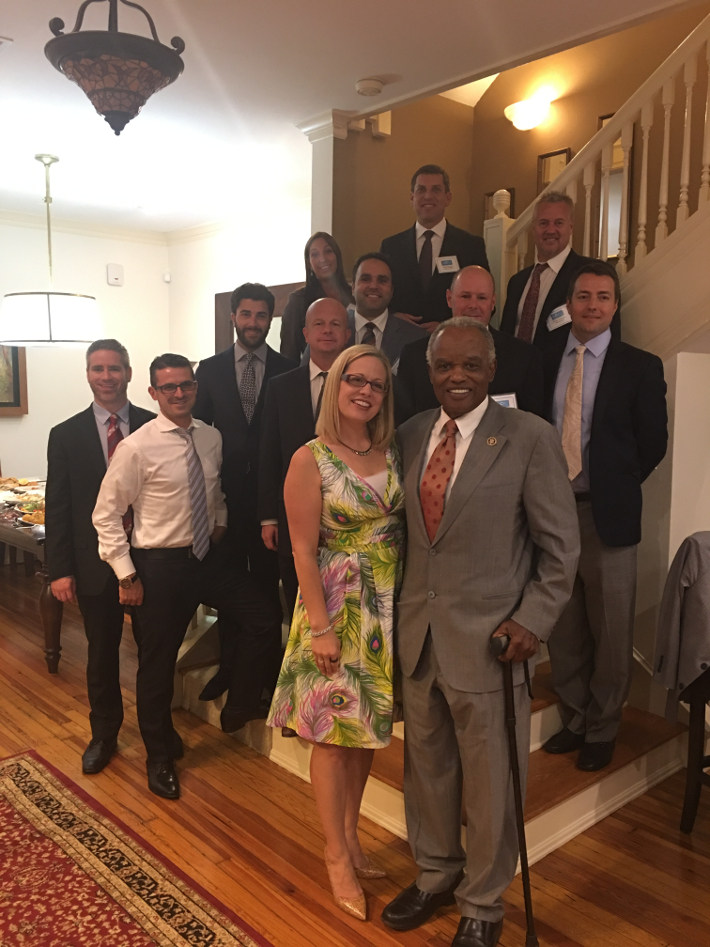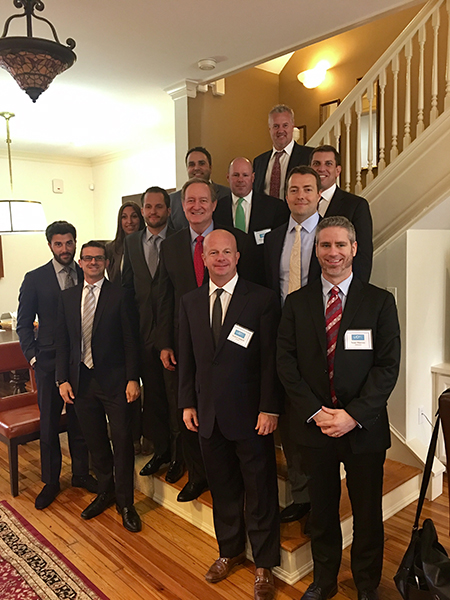Merchant Cash Advance’s Impact on Factoring
October 6, 2016 A little more than two years ago, the International Factoring Association voted to ban merchant cash advance companies from membership, citing loose underwriting standards and competitive pressure.
A little more than two years ago, the International Factoring Association voted to ban merchant cash advance companies from membership, citing loose underwriting standards and competitive pressure.
On Wednesday, at the NACLB conference in Las Vegas, Craig McGrain, President of factoring company Durham Funding, hinted on a panel at just how strong that competitive pressure has become. According to him, about 70-80% of their applicants today already have a merchant cash advance. Five years ago, it was only 5% of businesses, he said. He thinks a lot of that has to do with small businesses not knowing what all of their available options are.
The numbers may not be all that shocking considering that Funding Circle VP Michael Rabil also said at the conference that 30-40% of their applicants already have an MCA. Funding Circle provides small business term loans.
That’s a lot of merchants turning to MCA before finding their way to another product.
Mind The TCPA And Get deBanked All Over Again
October 4, 2016
deBanked’s September/October 2016 issue is set to go in the mail very soon. And in this issue, we wade chest-deep into a trend that has many brokers and funders worrying behind closed doors. In the last year there has been a surge of TCPA lawsuits, whether for robo-dialing, Do-Not-Call-List violations or something else. Are industry players being irresponsible or is there something else amiss? deBanked went looking for the answers and you might be surprised by some of the things we found.
If you’re wondering what TCPA lawsuits even are or how they might affect you, this story will hopefully teach you about the risks of marketing over the phone. Smile Dial… and Trial? You’ll want to read this.
If you’re already subscribed to receive the magazine, you’ll be getting your copy soon. If not, you should SUBSCRIBE NOW FREE
Commercial Finance Coalition Tells MCA Industry Story on Capitol Hill
September 23, 2016
Earlier this week, executives and representatives from the merchant cash advance industry met with dozens of policymakers on Capitol Hill. The Fly-In was hosted by the Commercial Finance Coalition, whose members make up a sizable chunk of the industry’s overall transaction volume. It was their second such event this year.

The opportunity allowed industry representatives to get face time with Republicans and Democrats from both the House and the Senate. One message of great importance was in communicating the challenges that small businesses face in trying to access less than $250,000 in working capital. Another was in distinguishing purchase transactions from loans.
“Our members are engaged and committed to educating and advocating the interests of the merchant cash advance industry in Washington DC and state capitals around the country,” said Isaac Stern, President of the CFC and Fundry. “I would strongly encourage my industry colleagues and competitors to get involved in the organization and help us grow the CFC.”
While banks have been accused of being too big to fail, the CFC noted that many businesses have become too small to survive as a consequence of banks moving upstream. Regulations have made it too burdensome and expensive for a bank to underwrite a $25,000 loan, plus they may not be able to stomach the risk or be properly incentivized to approve or decline a loan in the first place. The CFC’s members do not securitize their transactions or sell them off, lending credence to the position that their livelihood depends on small businesses succeeding and performing.
“In less than 9 months the CFC has become the gold standard of alternative small business finance trade groups in Washington,” said Dan Gans, Executive Director of the CFC. “In a short time we have been able to conduct over 50 meetings with key policymakers and assemble a world class regulatory and lobbying team. I would encourage anyone involved in the merchant cash advance or alternative small business finance space to join the CFC and help us advocate for the thousands of small businesses across the country who benefit from the access to needed capital provided by the industry.”
The CFC has not been the only coalition from the broad genre of fintech to host a Fly-In, making it all the more imperative for the MCA industry to educate policymakers on the specifics of what they do and how they do it. For instance, a lot of the regulatory discussion as of late has focused on the partnerships between online lenders and chartered banks, the legitimacy of those partnerships and the sustainability of the algorithms being employed to make quick decisions. While there are several MCA-like products that rely on that model, there is also an entirely different methodology that relies on helping small businesses by purchasing their future receivables. The CFC is one major coalition communicating that distinction.
The CFC is also currently accepting new members to join their cause and participate in future events.


IT’S A BROKER’S WORLD
August 31, 2016
From east to west, small businesses are getting funded. But how they’re found and who they work with depends on where they are. In the US, where brokers tend to have a love/hate relationship with the funding companies they work with, they are no doubt a driving force in the market. In other countries, they might not even exist, are just starting to bloom or they add balance to a mature market. Is the world built for brokers? deBanked traveled far and wide to find the answers.
Down under in Australia where American-based merchant cash advance and lending companies have expanded, the ISO (which stands for Independent Sales Office and is synonymous with broker) model has not really followed. David Goldin, CEO of Capify, an international company headquartered in New York, told deBanked that there’s very few ISOs in Australia.
 He believes that’s because there’s next to no payment processing ISO market there, a foundation that was a major precursor in the US towards the development of ISOs reselling merchant cash advances and business loans.
He believes that’s because there’s next to no payment processing ISO market there, a foundation that was a major precursor in the US towards the development of ISOs reselling merchant cash advances and business loans.
Luke Schmille, President of CapRock Services, echoed same. The Dallas-based company founded Sprout Funding in Australia earlier this summer as part of a joint venture with Sydney-based family office Huntwick Holdings. “Direct marketing is the primary method [of acquiring deal flow],” he said. “The credit card processing space is controlled by several large banks, so you don’t see ISO efforts in the acquiring space either.”
Big bank dominance was only one reason why another country’s emerging alternative small business funding market developed slowly. In Hong Kong, non-bank alternatives like merchant cash advances faced legal uncertainty for a long time. For example, Global Merchant Funding (GMF), once the only merchant cash advance company in the Chinese special administrative region, had been relentlessly pursued for years by the Secretary for Justice for conducting business as a money lender without a license. GMF fought it. And won.
In May of this year, the legality of merchant cash advances ultimately prevailed after the highest court ruled the agreements were not loans. Emboldened, several companies have stepped up their marketing of the product. But whether they’re doing daily debit loans or split-processing merchant cash advances (both of which exist there), marketing tends to be directed at merchants, not a middle market of brokers.
 Gabriel Chung of Hong Kong-based Advanced Express Capital said that there are a handful of large brokers typically comprised of former bankers, but the rest of the broker market is highly fragmented, mostly made up of individual freelancers.
Gabriel Chung of Hong Kong-based Advanced Express Capital said that there are a handful of large brokers typically comprised of former bankers, but the rest of the broker market is highly fragmented, mostly made up of individual freelancers.
Adrian Cook, the Founder and CEO of Hong Kong-based Asia Capital Advance, agreed that marketing is usually aimed at merchants directly but that it’s changing. “Since the market is still very new and MCA is only beginning to gain popularity, brokers on the market are only starting to recognize MCA,” he said. “There is a lot of room for the brokerage market to grow.”
In the UK, where Capify also operates, CEO David Goldin explained that the UK doesn’t have a lot of credit card processing ISOs so there wasn’t a major migration from that business to MCA like there was in the US. But that doesn’t mean there is no middleman market at all.
 Paul Mildenstein, executive director of London-based Liberis, said that brokers are an important channel, but not as dominant as they are in the US. “Our brokers are usually members of the NACFB, an organisation in the UK that actively supports and provides operating principles to the furtherance of the commercial finance broker community,” he wrote. The National Association of Commercial Finance Brokers claims to have 1600 members, one among them is Liberis.
Paul Mildenstein, executive director of London-based Liberis, said that brokers are an important channel, but not as dominant as they are in the US. “Our brokers are usually members of the NACFB, an organisation in the UK that actively supports and provides operating principles to the furtherance of the commercial finance broker community,” he wrote. The National Association of Commercial Finance Brokers claims to have 1600 members, one among them is Liberis.
“Many clients want the support of an experienced professional who can discuss the financial options available to them in their specific circumstances,” said Liberis’ CEO, Rob Straathof. “Given relatively low awareness of the Business Cash Advance product in the UK, this means that brokers have a key role to play in educating potential customers on when this is the right option for them,” he added.
Straathof stressed a robust criteria for the brokers they work with and explained that brokers are their eyes and ears in the market. “The relationships we have with them are not transactional, but transformational for our business,” he said.
The NACFB was also praised by Alexander Littner, Managing Director of Chelmsford, Essex-based Boost Capital. The company, which is actually a subsidiary of Coral Springs, FL-based BFS Capital in the US, sees a balance between their use of brokers and their efforts to acquire customers directly.
“As the alternative finance market is still relatively new here in the UK these brokers are important for this independent advice, and to help educate the market and establish trust,” Littner said. “At Boost Capital we work very closely with brokers across the UK, they are a critical part of our growth and fundamental to our ongoing success.”
In the US, brokers play such a dominant role in customer acquisition that some MCA funding companies rely on them to source the entirety of their business. Back in February, Jordan Feinstein of NY-based Nulook Capital told deBanked, “We decided that the best way to grow is to build relationships to avoid the overhead, compliance, training and manpower that a sales team would require.” Nulook markets its broker-only approach as a strength.
Others take a more blended approach, like Justin Bakes, CEO of Forward Financing, for example. “While our priority is to self originate, it is essential to create and maintain partnerships in this business,” he said earlier this year.
Notably, no such guiding authority like the UK’s NACFB exists for brokers in the US so it’s not easy to track exactly how many there are or how they operate, but their role in the industry cannot be understated. deBanked actually labeled 2015 The Year Of The Broker, when it published an article in its March/April 2015 issue that tried to capture the essence of the industry at the time. Tom McGovern, who was then a VP at Cypress Associates LLC, said of brokers, “They’re like the missionaries of the industry going out to untapped areas of the market.”
But preaching the gospel of alternative funding exists at different stages across the world. And Goldin, whose company Capify operates in four countries including the US, thinks that many middlemen here at home may not ultimately survive. In an interview, he predicted that the stronger ones over time will be acquired by funding companies and that direct marketing will only increase. “I think more and more companies are going to start building their own internal sales forces,” he said.
Other brokers are not convinced that acquisition costs will lead to the death of their businesses, especially if they’ve already found ways to reduce overhead costs. Several brokers have discreetly mentioned running operations from Costa Rica, Nicaragua or elsewhere as a way to keep things profitable. Still more, like Excel Capital Management based in Manhattan, have found that offering a suite of products allows them to monetize more customers. Chad Otar, a managing partner for Excel, said that they recently brokered a $4.9 million SBA loan. MCA is just one of their options these days. “As long as there’s small businesses, there’s always going to be opportunity,” he said.
 In the US, the brokers have certainly seized it, but that’s because most funding companies offer big bucks and quick payment to those that are capable of sourcing customers. In other countries, compensation for services rendered might be the responsibility of the broker to arrange with the merchant since it may not be customary for funding providers to pay commissions. That would mean more work and more risk for the broker.
In the US, the brokers have certainly seized it, but that’s because most funding companies offer big bucks and quick payment to those that are capable of sourcing customers. In other countries, compensation for services rendered might be the responsibility of the broker to arrange with the merchant since it may not be customary for funding providers to pay commissions. That would mean more work and more risk for the broker.
Ironically, some brokers in the US will tap into both sides, earning a commission from the funder and charging a fee to the merchant for services rendered. And if the broker has payment processing roots, they can go a step further and earn merchant account residuals as well.
Brokers can’t exist without funding companies willing to support their endeavors, of course. While their prevalence around the world varies, most of the funding companies deBanked spoke to, appear eager to nurture the middleman’s role, so long as they act responsibly.
“Brokers in the UK are incredibly important as independent advisors to small businesses on the various sources of finance to suit their needs,” said Littner.
And as long as those customers, wherever they may be, are getting the value they want from a broker, that role, so long as it can continue to be done profitably, will likely have a place in the world for the foreseeable future.
Can an ISO “Excel” in 2016?
August 26, 2016
Don’t let anyone tell you that it’s too hard for a commercial finance broker to make a buck in exchange for honest work these days. One ISO in lower Manhattan is seeing more opportunity than ever before. Chad Otar, a managing partner of Excel Capital Management, sat down with deBanked to make his case for a bright future.
“As long as there’s small businesses, there’s always going to be opportunity,” Otar said. “Business owners are always going to need money.” Ironically, his own company that he cofounded in 2013 with hometown friend Nathan Abadi, was formed without any outside debt. Bootstrapped even to this day and even as they’re expanding, they’ve seen firsthand what other businesses around the country have to go through to get ahead.
“We’ve always believed in the products that we’ve sold,” said Otar, who brokers merchant cash advances, business loans, SBA loans, factoring products and more. They want every deal to help their clients whether it’s big or small, explaining further that even he himself has to feel comfortable with what the merchant wants. When asked about size, Otar said the largest SBA loan they got done was for $4.9 million.
But when questioned if more merchants were moving towards factoring and other traditional products, he explained that some merchants just don’t want to deal with the hassle of something that might be overly invasive or a process that might take a long time. They just want to get funded quickly, he said. And that’s where they come in.
Otar and Abadi’s optimism is not just anecdotal. The two partners, who previously renewed one year leases for their small office on Maiden Lane, saw enough runway to recently sign a five year lease for a 2,700 sq ft. office on Greenwich Street, staying within the bounds of the city’s financial district. Between full time employees and contractors, they currently house about fifteen people in their new office.
 Though the partners live in Brooklyn, they, like many other companies in the industry, believe a Manhattan headquarters makes the most sense. “Everything is here,” Otar said. It’s easier to recruit new hires, he explained. And they indeed have immediate hiring plans now that they’ve got the space for it, both in sales and operationally.
Though the partners live in Brooklyn, they, like many other companies in the industry, believe a Manhattan headquarters makes the most sense. “Everything is here,” Otar said. It’s easier to recruit new hires, he explained. And they indeed have immediate hiring plans now that they’ve got the space for it, both in sales and operationally.
This new up-and-coming generation of business owners is very comfortable with the Internet and technology, Otar added, speeding up the process and allowing they and the funding partners they work with to do more deals together. One example offered was a small business owner who gave a guided tour of his establishment to an underwriter using FaceTime on his phone. Normally, the process would’ve been delayed by a few days because of the time it takes to hire a third party to perform a site inspection.
Some funding partners offer DocuSign so that merchants don’t even have to spend time printing and signing documents anymore, he said, qualifying that however by adding that while some merchants love it, others hate it and feel more comfortable doing things the old fashioned way. He acknowledged that was likely due to the generational gap that still exists.
When asked if the setbacks and gloom that had begun to envelop the consumer lending side of fintech, was also affecting the commercial side, Otar said he didn’t see it. Funders are still very aggressive with approvals and terms, he said. While paperwork required for approval is declining overall, he described one obstacle that he hadn’t really dealt with in previous years, UCC filings that are accidentally left active even when the agreements are satisfied in full.
Underwriters doing due diligence might interpret active UCCs to mean that outstanding obligations still exist. Absent a formal termination of the UCC, an underwriter may request that merchants provide documents from the secured party to support that a termination should’ve been filed. This in itself is not a burdensome task but Otar said he has seen merchants who have used alternative financing products continuously over the last eight years or so, who are then challenged to produce satisfaction letters from dozens of companies, some of whom the merchant may only vaguely remember.
But he is not discouraged when new challenges come up. “We’ve been constantly learning,” he said. And when asked what their secret to success has been up until this point, “It’s hard work and dedication,” he responded.
Can Technology Be More Than Automation?
August 19, 2016
In yet another Lending Club exposé, Bloomberg revealed the identity of the man who allegedly first discovered suspicious Lending Club loans that would later be confirmed connected to disgraced CEO Renaud Laplanche in a post-resignation audit. Brian Sims, a retail investor in Lending Club loans used a specially designed algorithm to spot patterns such as multiple loans made to a single borrower at different interest rates. No easy task considering Lending Club takes great strides to protect borrower identity.
And this truly is the argument both for and against technology. Irrespective of what side of the debate you’re on, it’s hard to argue its indispensability in day to day business. It’s the one thing CEOs think long and hard about and rightly so — automation makes or breaks the size and scale of a business, vastly improves productivity and narrows if not eliminates the margin for human error (up for debate).
So, at deBanked we were curious to discover how small business financing companies use technology in their companies, what processes are automated and which side of the man vs machine debate they fall on.
Boston-based Forward Financing that makes merchant cash advances, working capital finance and small business loans up to $300,000 started investing in proprietary software right from the beginning, four years ago. It uses Salesforce for customer relations and basic reporting.
Its underwriting tool, channels leads and performs varying levels of automation to underwrite files quicker. The app pulls data from a number of different sources like credit bureaus, public record databases, social media and Google APIs before it goes to an underwriter. “Our goal over the next 3-4 months is to automate a percentage of all the deals that comes through the system,” said CEO Justin Bakes.
The company also has a banking application, a portal where customers log in with their bank details, with read-only access to their bank accounts to identify and analyze transactions which are then used to underwrite. Separately, it also has a portfolio management system that manages all the funding, transactions and all the collections.
While Bakes started investing in technology early on, it wasn’t until a year and a half ago that he tried automated underwriting. “Some hear the word automation and think they are going to lose their jobs,” said Patrick Hereford, Director of Technology at Forward Financing. “I can understand that automation can reduce jobs, but here, they found that they could underwrite more deals faster and with more accuracy.”
Hereford was hired in October last year from the TV show America’s Test Kitchen where he was working as a software engineer. Hereford makes a case for automated underwriting with proof — “We went from spending 20 minutes per file to six minutes per file,” he said. “We were expecting 50 percent efficiency in underwriting but we got more and increased productivity.”
 The company hired full-time engineering staff last year to move all their tech support and development in house. “A majority of our new hires and investments have been in technology. The tech team has grown the most over the last year,” said Bakes. He noted that the company has spent over a million dollars in building proprietary software alone and 20 percent of its selling, general and administrative (SG&A) is allocated to technology development.
The company hired full-time engineering staff last year to move all their tech support and development in house. “A majority of our new hires and investments have been in technology. The tech team has grown the most over the last year,” said Bakes. He noted that the company has spent over a million dollars in building proprietary software alone and 20 percent of its selling, general and administrative (SG&A) is allocated to technology development.
“There is no doubt that we are a financing company but we are a tech-minded financing company. To be a true industry leader, you have to automate a certain amount. Our philosophy is we plan to keep improving our technology and the ability to approve faster than anyone else,” Bakes said.
Forward Financing is among other companies moving in that direction. California-based lender National Funding who has deployed $1.5 billion to small businesses over the last 17 years is also preparing for a technology overhaul, trying to get access to data pools to automate underwriting. “We need to be tech driven, as deals get smaller, we need to automate them to make it affordable,” National Funding CEO Dave Gilbert told deBanked earlier.
And five-year-old Pearl Capital is on a similar journey. The company grew its tech team from two to twelve people over a year and a half ago including data analysts and statisticians and is making significant investments in scoring technology, portfolio management and risk assessment. “We had a human model running successfully for years and they produce good results but move to machine is additive and supplemental,” said CEO Sol Lax. “Data and tech add a lot more texture and nuance to the market, it’s like the weather radar, you have visibility and can price accordingly.”
But technology doesn’t have to necessarily mean automating underwriting. In fact, there is a strong bastion of people actively resisting it. Isaac Stern, CEO of New York-based Yellowstone Capital is one of them. “I am going to get my underwriters as much information as possible – background check, credit check to make good decisions but that does not mean I am going to let a computer decide whether to fund or not.”
That doesn’t mean Stern doesn’t care about efficiency. In fact, Yellowstone has invested over a million dollars over the last year in ramping up technology. It hired AIG’s chief data scientist and has improved data mining with access to over 140 data points including SIC codes, credit scores and loan history. The company uses an application called Clear®, a Thomson Reuters product, through which it can conduct background checks as well as review business history and public records.
No matter what camp you belong to, there are strong arguments to be made for each side and it really comes down to the philosophy of the matter. But in a crowded lending market, does it make sense to grab every opportunity to scale better?
“Different people have different thoughts on whether this is frankenstein going off the rails or not and whether that will blow up or not,” said Lax. “But the barrier to entry is low as a funder, and the spend on tech can be small yet profitable.”
There are many alternative finance companies who believe that staying in the game requires some change in incumbent models to boost efficiency and speed that’s driven by auto approvals and declines. But there are also some like Stern who treat technology as an aid rather than an aim.
Perhaps time will tell which system is better.
Is The “Uber” Of Merchant Cash Advance Actually Uber?
August 15, 2016
If imitation is the sincerest form of flattery, Uber is paying the alternative small-business finance industry a high compliment. The San Francisco based ride-sharing company is offering its drivers some programs that closely resemble merchant cash advances.
New drivers receive part of the advance before they pick up their first fare and the rest soon after that initial ride. Clearbanc, which bills itself as a financial services provider for “the self-employed, freelancers, independent contractors and entrepreneurs,” is putting up the money. As with a merchant cash advance, drivers can choose to pay back the Advance Pay funds by directing a portion of their weekly earnings to Clearbanc, according to a blog by Rachel Holt, an Uber regional manager. In the test the companies are limiting the automatic deductions to no more than 50% of the driver’s weekly paycheck, she said. Participating drivers can still work whatever hours they choose.
If $1,000 isn’t enough to put an aspiring Uber driver on the road, the company has another plan. Through the XChange Leasing program Uber automatically deducts car lease payments from drivers’ weekly income, a company spokesperson said. A number of financial institutions work with the ride-sharing company in the program, according to the Uber website.
Applicants have to agree to what the company calls “a routine screening.” If they’re approved they receive a list of participating local car dealers. The leases are up to three years for new cars valued at as much as $20,000 and used cars worth up to $18,500. Cars can’t be more than seven years old or have more than 75,000 miles. They have to have four doors and five seat belts. Drivers put up a $250 security deposit when they receive the leased car. Typically, they might have 156 payments of $115 each for a 2013 Toyota Corolla or 156 payments of $143 each for a 2016 Corolla. California requires rideshare insurance, and Uber provides it through Farmers Insurance or Mercury Insurance.
 Unlike many standard automobile leases, XChange Leasing does not have mileage caps, and drivers can exit the program by giving two weeks notice and paying a $250 “disposition fee,” essentially forfeiting their security deposit, the Uber spokesperson said. For drivers who prefer to own their vehicles, Uber has negotiated fleet discounts with a long list of car manufacturers, the company said. The deals can reportedly bring drivers thousands of dollars in savings over the sticker price of a car. Meanwhile, Uber is testing another foray into financial services. Drivers can use “Instant Pay,” an Uber debit card from Green Dot’s GoBank division, to collect the cash immediately after finishing a ride, according to Holt. The cards don’t require a minimum bank balance and don’t carry any fees, she said.
Unlike many standard automobile leases, XChange Leasing does not have mileage caps, and drivers can exit the program by giving two weeks notice and paying a $250 “disposition fee,” essentially forfeiting their security deposit, the Uber spokesperson said. For drivers who prefer to own their vehicles, Uber has negotiated fleet discounts with a long list of car manufacturers, the company said. The deals can reportedly bring drivers thousands of dollars in savings over the sticker price of a car. Meanwhile, Uber is testing another foray into financial services. Drivers can use “Instant Pay,” an Uber debit card from Green Dot’s GoBank division, to collect the cash immediately after finishing a ride, according to Holt. The cards don’t require a minimum bank balance and don’t carry any fees, she said.
The company seemed upbeat about its new offerings. “We look forward to seeing how these pilots progress and to making innovative payment solutions more widely available to drivers soon,” Holt said in her blog of Advance Pay and Instant Pay.
But some Uber drivers don’t share that optimistic view. In fact, Advance Pay and XChange Leasing have both come under fire for what critics view as disadvantages for drivers and for the economy as a whole. Some have gone so far as to label the lease terms practices as predatory.
Uber offers Advance Pay only to new drivers, and they could receive just about as much as a signup bonus, according to a blog on UberPeople.net, a website for drivers. The author of the blog speculated that the company is using Advance Pay to eliminate the signup bonus and also to do away with its bonus for referring new drivers.
Drivers have to pay off the advance in 15 weeks, according to the UberPeople blogger. At the rate of 30 cents per mile that drivers receive in Detroit, paying back the $1,000 would require logging 3,333 miles, approximately the distance from New York to California, the blogger lamented. However, Uber pays a lower rate in Detroit than in most cities, according to statements from other drivers.
And although Advance Pay carries no interest, Clearbanc charges drivers a fee of up to $50 if they fail to pay off the advance in 15 weeks, according to published reports.
Complaints also arise with XChange Leasing, according to a website called therideshareguy.com. Dealers sometimes refuse to provide used cars for the program because they can make more money with new cars, according to the site.
If the dealers are willing to provide used cars, problems sometimes surface because XChange Leasing prohibits leasing a used vehicle for more than 105% of its book value, the site said. Cars with a reputation for reliability, such as Toyotas and Hondas, often sell for more than book value, according to the site.
 Drivers have reported elsewhere that they feel trapped by the leases, many of them continuing to work for Uber just to make the payments. However, the Uber spokesperson maintained that drivers can leave the program anytime after the first 30 days. Some critics bemoan the spread of subprime auto leases, which they have compared to the subprime mortgage debacle that contributed to the Great Recession that struck in 2008. Uber prefers comparisons to Amazon, a company that has expanded by continuing to enter new businesses.
Drivers have reported elsewhere that they feel trapped by the leases, many of them continuing to work for Uber just to make the payments. However, the Uber spokesperson maintained that drivers can leave the program anytime after the first 30 days. Some critics bemoan the spread of subprime auto leases, which they have compared to the subprime mortgage debacle that contributed to the Great Recession that struck in 2008. Uber prefers comparisons to Amazon, a company that has expanded by continuing to enter new businesses.
In general, Uber has met resistance repeatedly from traditional taxi drivers who find their livelihood threatened by the ride-sharing service. Taxi drivers around the world have chided Uber for failing to pay taxes, obtain taxi licenses and uphold safety standards.
Complaints aside, Uber continues to grow prodigiously and now serves riders in more than 400 cities in 70 countries, according to metrics supplied by the Uber spokesperson. Seventy-five percent of Americans live in counties where Uber operates, the spokesperson added. Globally, Uber employs 7,000 workers and 1 million drivers, the company said.
The word “uber” is defined as “denoting an outstanding or supreme example of a particular kind of person or thing, according to a dictionary entry the company sometimes cites. In German, “uber” means “across” or “above.” Many potential riders know the word “uber” from the phrase “Deutschland, Deutschland uber alles,” a line from the German national anthem that translates as “Germany, Germany above all else.” The words to the song were written during Germany’s unification, and the lyrics refer to the idea that allegiance to the nation should trump loyalty to local kingdoms. Maybe Uber should stick with its own definition of “uber.”
California Finance Lenders Law Licensing Compliance for Merchant Cash Advance Financiers
August 2, 2016 Since the Richard B. Clark v. AdvanceMe Inc. class action case settlement was brought to the awareness of the Merchant Cash Advance (“MCA”) industry, many MCAs applied and obtained a California Finance Lenders Law License from the Department of Business Oversight. (“DBO”)
Since the Richard B. Clark v. AdvanceMe Inc. class action case settlement was brought to the awareness of the Merchant Cash Advance (“MCA”) industry, many MCAs applied and obtained a California Finance Lenders Law License from the Department of Business Oversight. (“DBO”)
After your company obtains a California Finance Lenders Law license, it will then need to comply with the California Finance Lenders Law. (“CFLL”)
CFLL does not contain specific financial code sections and regulations to regulate MCAs. However, CFLL regulates consumer and commercial loans. So, MCAs licensed under the CFLL will need to comply with the code sections and regulations that apply to commercial loans, assuming that MCAs provide advances that are each “bona fide” $5,000 or more in principal amount and for commercial purposes.
The MCA contract you use when making advances in other states is likely not in compliance with CFLL. CFLL regulation includes without limitation, (either directly or by incorporation of other California and federal laws) the rates and charges, marketing and advertising, disclosures, contractual provisions, electronic transactions, collections, credit applications, default and repossession, brokers and finders, and general operations of main and branch offices.
The CFLL license application requires the MCA company’s principal (corporate officer or LLC manager) to acknowledge on behalf of the MCA company, that it read the contents of and is familiar with the CFLL, and that it agrees to comply with the CFLL.
Lack of compliance can be brought to the attention of DBO’s enforcement officials as a result of either, a customer or competitor complaint, a DBO audit, through the Annual Report that must be filed by CFLL licensees by March 15 of each year, or by other means.
It is important to not only obtain the CFLL license, but to also comply with the CFLL to keep the license. DBO publishes online enforcement actions, such as Desist and Refrain Orders and Accusations. A CFLL licensee has a right to request an administrative hearing to defend itself and present its case. Unfortunately, although the legality of this practice by DBO is questionable, DBO publishes online none-final (and also final) administrative enforcement actions such as Desist and Refrain Orders (“D&Rs”) and Accusations. (publishing of final administrative orders is specifically authorized by the Financial Code but not none-final orders) Potential customers and competitors who review none-final D&Rs, are under the mistaken belief that the D&R is a final order, and may therefore refuse to conduct business with the licensee.
MCAs who are either CFLL licensees or potential licensees should familiarize themselves with CFLL law to avoid administrative enforcement actions, court actions, loss of business, and other adverse repercussions.






























